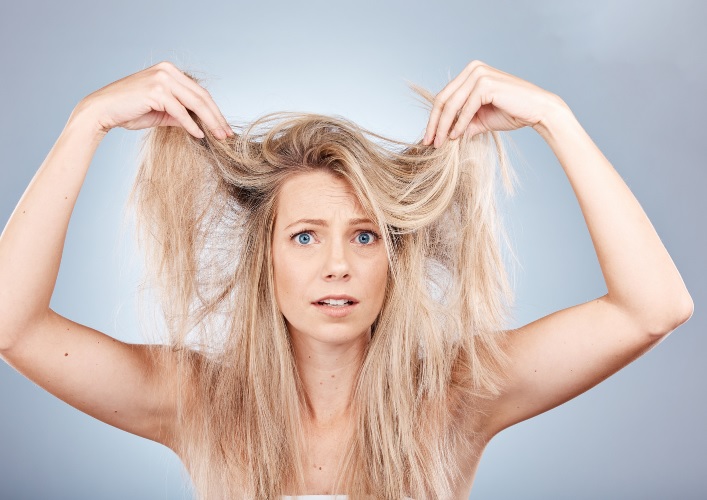
What are some potential reasons for your hair loss?
Female Hair loss can be caused by a variety of factors, including:
Genetics
The most common cause of hair loss is hereditary, also known as male-pattern or female-pattern baldness. Just like in men, female pattern hair loss has a genetic component. It tends to run in families, with inheritance patterns varying. If your mother, grandmother, or other female relatives experienced hair thinning or baldness, you may be more likely to as well.
In women, hair loss due to genetics typically manifests as thinning of the hair, especially at the crown and along the part line. Hair may gradually become thinner over time rather than falling out in large patches as it can in some other types of hair loss.
Hormonal Changes
Hormonal changes due to pregnancy, childbirth, menopause, or thyroid problems can cause temporary or permanent hair loss. While androgens (male hormones) play a significant role in male pattern baldness, their role in female pattern hair loss is more complex. While women do produce androgens, the link between androgen levels and female pattern hair loss isn’t as straightforward. However, genetic factors can influence how hair follicles respond to androgens.
Medical Conditions
Hormonal imbalances due to conditions such as polycystic ovary syndrome (PCOS), thyroid disorders (hypothyroidism or hyperthyroidism), and menopause can cause hair loss in women. Fluctuations in hormone levels can affect the growth cycle of hair follicles.
Alopecia areata is an autoimmune condition that causes hair loss in patches on the scalp and sometimes other parts of the body. It occurs when the immune system mistakenly attacks hair follicles, leading to hair loss. Or, Scalp conditions such as seborrheic dermatitis, psoriasis, and fungal infections (such as tinea capitis) can cause inflammation and damage to the scalp, leading to hair loss.
Telogen effluvium is a type of hair loss characterised by excessive shedding of hair, often triggered by significant physical or emotional stress, surgery, illness, rapid weight loss, or childbirth. It disrupts the normal hair growth cycle, leading to increased shedding.
Certain medications, such as chemotherapy drugs, anticoagulants, beta-blockers, retinoids, and some antidepressants, can cause hair loss as a side effect. Nutritional Deficiencies: Deficiencies in essential nutrients such as vitamin D, vitamin B12, zinc, and protein can impact hair health and contribute to hair loss.
Medications and Treatments
Some medications, such as those used for cancer, arthritis, depression, heart problems, and high blood pressure, can cause hair loss as a side effect. Additionally, treatments like chemotherapy and radiation therapy commonly cause hair loss.
Stress
Physical or emotional stress can lead to temporary hair loss called telogen effluvium. It is important to note that while stress can contribute to hair loss, it is rarely the sole cause. Hair loss is often multifactorial, with genetic predisposition, hormonal factors, medical conditions, medications, and other lifestyle factors also playing a role.
Nutritional Deficiencies
Deficiencies in essential nutrients like iron, protein, vitamin D, and vitamin B12 can contribute to hair loss. Addressing nutritional deficiencies through a balanced diet or supplementation, as recommended by a healthcare professional, can help improve hair health and prevent further hair loss.
Hair Styling and Treatments
Overuse of hair styling products, frequent use of hair dryers or straighteners, and chemical treatments like bleaching, colouring, or perming can damage the hair and cause it to fall out. Do not underestimate the role these types of products can play in the thinning of hair.
Age
As people age, their hair naturally becomes thinner and may start to fall out. Age-related hair loss, often referred to as senescent alopecia or involutional alopecia, is a natural part of the aging process.
Poor Scalp Health
Conditions like dandruff, psoriasis, and seborrheic dermatitis can affect the health of the scalp and contribute to hair loss.
Treatment Options
Treatment options for female pattern hair loss include medications like minoxidil (Rogaine), which can help stimulate hair growth, and certain oral medications that may help block the effects of androgens on hair follicles. Additionally, treatments like low-level laser therapy and platelet-rich plasma (PRP) therapy may also be considered.
Specialist hair supplements like HR23+ can play a key role in hair loss prevention. HR23+ is designed to minimise excess hair shedding in men and women suffering from early stages of baldness and thinning hair. HR23+ is the #1 hair supplement, and it is frequently recommended by hair clinics, trichologists, and industry professionals. 92% of female users have seen visible results in their hair within 12 weeks of using HR23+.
If you’re experiencing significant hair loss and are concerned about it, it’s best to consult with a healthcare professional or a dermatologist who can assess your specific situation and provide personalized advice and treatment options.


Leave a Reply